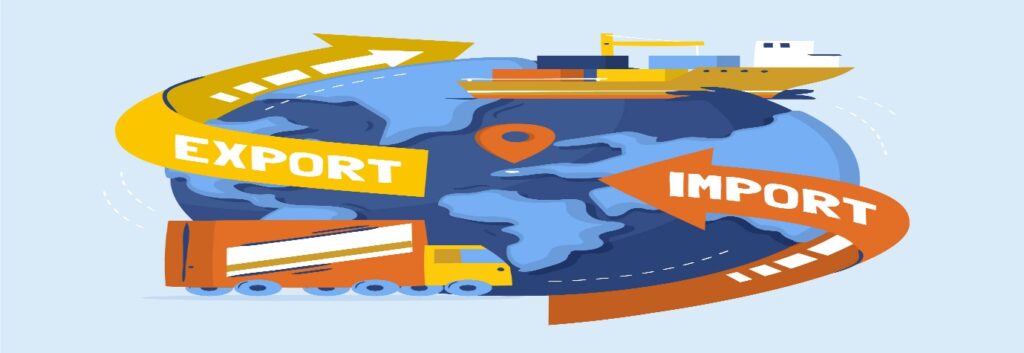International trade
International trade (or foreign trade) is the exchange of goods and services between different countries. Foreign trade, which is the widest concept, has both advantages and disadvantages. The advantages and disadvantages of foreign trade significantly influence the overall economic disposition. Foreign trade allows nations to specialize in production. It creates larger but more segmented markets that, in turn, create added value to the economy. Foreign trade also has disadvantages, like dependence on foreign economies, trade imbalances, and vulnerability and so on. Optimal foreign trade ensures good things for one country and bad for another. The benefits and drawbacks of international trade allow businesses and governments to make sound judgments regarding their policies on trade and financial plans. Hence, businesses and policymakers must understand foreign trade types and their influence.
Despite its importance, foreign trade can have both positive and negative effects on the countries involved. Hence, we’ll explore the advantages and disadvantages of foreign trade and how it affects nations worldwide.
Advantages of foreign trade

1.Economic Growth and Development
One of the primary benefits of international trade is its contribution to the growth of economic activities. Trade has the effect of generating income through exports for a country, therefore increasing its GDP. Economic activity increases employment opportunities, higher income, and increased living standards. International trade also benefits developing nations by allowing them to industrialize and modernize their economies. By exporting primary products and importing sophisticated machinery, these countries would be able to develop their industries and increase efficiency.
2.Access Goods and Services
Foreign trade provides an opportunity for countries to access goods and services that may not be available locally. Trade between countries allows for the exchange of new ideas, technology, and culture. It also increases competition, which often results in better quality and lower prices for goods and services.
3.Cultural Exchange
Another advantage of foreign trade is that it can lead to increased cultural exchange. When countries trade with each other, they also exchange ideas, customs, and cultures. This can lead to
a greater understanding and appreciation of different cultures and can also lead to the spread of new technologies and ideas.
4.Increased Market
The constraints of domestic markets are their demand, resources, and customers. International trade may open gates to a firm so that it can access much larger markets than national markets. Firms that trade across borders can sell to millions of customers worldwide. A good example is electronic goods produced by a company in China. This company can export the products to consumers in America, Europe, and Africa. This wider scope of market expansion enables businesses to expand their operation, increase revenue, and build brand presence globally.
5.Effective Use of Resources
Different countries have different types of natural and human resources. Due to international trade, the countries can specialize in producing the products in which a particular country has comparative advantages. Therefore, they produce the goods on which they are comparatively advantageous, and other stuff is imported that they cannot manufacture properly.
6.Cost Reduction
In international trade, companies get the opportunity to acquire raw materials and labour from countries where costs are cheaper. Many industries have set up production facilities in countries where labour wages are minimal, taxes are lesser, and economic policies are friendly. Consumers benefit from international trade, too, because they get imported goods at relatively more affordable prices. They get better purchasing power and upgraded living standards.
7.International Relations
Trade facilitates the formation of diplomatic as well as economic relations between states. States that bargain over trade matters frequently have long-term alliances, often reducing the probability of conflict and political tensions. When countries depend on each other for goods and services, they become more prone to maintaining peace and working together on problems like climate change, economic development, and security issues.
Disadvantages of foreign trade

While foreign trade offers a range of potential benefits, it is important to remember that it also carries certain risks. some of them are discussed below.
1.Economic Dependency and Vulnerability
Economic dependency is one of the primary disadvantages associated with international trade. If a country depends greatly on exports or imports, it will be vulnerable to economic conditions in foreign economies. Economic dependence also means loss of control over the country’s economy. Such foreign companies that dominate the local industries may determine market conditions, price levels, and the general employment trend.
2.Currency Fluctuations
One of the primary disadvantages of foreign trade is the exposure to currency fluctuations. A large part of international trade involves exchanging goods and services denominated in different currencies, meaning that exchange rate changes can have a substantial impact on a business’s bottom line. This can result in businesses losing money due to unfavourable changes in currency values.
3.Higher Transaction Costs
Foreign trade can also be subject to higher transaction costs due to the associated transportation and logistics expenses. Shipping goods over long distances can be expensive and time-consuming, which can have an impact on a business’s bottom line. Additionally, businesses often have to pay various taxes, tariffs, and fees related to international trade, adding to their overall costs.
4.Trade Deficits and Balance of Payments Problems
A trade deficit occurs if a country imports more than it exports. This imbalance may lead to a negative balance of payments, increasing the national debt and decreasing foreign exchange reserves. Continuous trade deficits force countries to borrow money to finance their imports.
5.Loss of Domestic Industries
nternational companies create cheaper products while providing higher quality when entering a local market. Though this benefits the consumers, it usually hurts the domestic industries that cannot compete. Consequently, most small businesses go out of their way and increase unemployment through economic instability.
